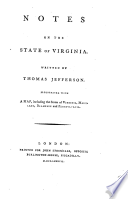Quotes from book
Notes on the State of Virginia

Notes on the State of Virginia is a book written by Thomas Jefferson. He completed the first version in 1781, and updated and enlarged the book in 1782 and 1783. Notes on the State of Virginia originated in Jefferson's responding to questions about Virginia, posed to him in 1780 by François Barbé-Marbois, then Secretary of the French delegation in Philadelphia, the temporary capital of the United Colonies.

Query XVII
1780s, Notes on the State of Virginia
Context: Difference of opinion is advantageous in religion. The several sects perform the office of a Censor morum over each other. Is uniformity attainable? Millions of innocent men, women, and children, since the introduction of Christianity, have been burnt, tortured, fined, imprisoned; yet we have not advanced one inch towards uniformity. What has been the effect of coercion? To make one half the world fools, and the other half hypocrites. To support roguery and error all over the earth. Let us reflect that it is inhabited by a thousand millions of people. That these profess probably a thousand different systems of religion. That ours is but one of that thousand. That if there be but one right, and ours that one, we should wish to see the 999 wandering sects gathered into the fold of truth. But against such a majority we cannot effect this by force. Reason and persuasion are the only practicable instruments. To make way for these, free enquiry must be indulged; and how can we wish others to indulge it while we refuse it ourselves?

“I tremble for my country when I reflect that God is just: that his justice cannot sleep for ever”
Query XVIII (1782); for more quotes from this document see: Notes on the State of Virginia (1781-1785)
1780s, Notes on the State of Virginia
Context: In a warm climate, no man will labour for himself who can make another labour for him. This is so true, that of the proprietors of slaves a very small proportion indeed are ever seen to labour. And can the liberties of a nation be thought secure when we have removed their only firm basis, a conviction in the minds of the people that these liberties are of the gift of God? That they are not to be violated but with his wrath? Indeed I tremble for my country when I reflect that God is just: that his justice cannot sleep for ever: that considering numbers, nature and natural means only, a revolution of the wheel of fortune, an exchange of situation, is among possible events: that it may become probable by supernatural interference!

“An elective despotism was not the government we fought for”
Query XIII
1780s, Notes on the State of Virginia
Context: All the powers of government, legislative, executive, and judiciary, result to the legislative body. The concentrating these in the same hands is precisely the definition of despotic government. It will be no alleviation that these powers will be exercised by a plurality of hands, and not by a single one. [... ] As little will it avail us that they are chosen by ourselves. An elective despotism was not the government we fought for; but one which should not only be founded on free principles, but in which the powers of government should be so divided and balanced among several bodies of magistracy, as that no one could transcend their legal limits, without being effectually checked and restrained by others.